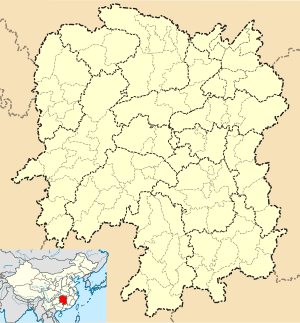Leiyang
| Leiyang 耒阳市 | |
|---|---|
| County-level city | |
|
| |
 Leiyang Location in Hunan | |
| Coordinates: 26°24′36″N 112°55′44″E / 26.410°N 112.929°ECoordinates: 26°24′36″N 112°55′44″E / 26.410°N 112.929°E | |
| Country | People's Republic of China |
| Province | Hunan |
| Prefecture-level city | Hengyang |
| Area | |
| • Total | 2,656 km2 (1,025 sq mi) |
| Population | |
| • Total | 1,300,000 |
| • Density | 490/km2 (1,300/sq mi) |
| Time zone | China Standard (UTC+8) |
| Website |
leiyang |
Leiyang (simplified Chinese: 耒阳; traditional Chinese: 耒陽; pinyin: Lěiyáng) is a county-level city in Hengyang, Hunan province. It is located in the southeast of Hengyang City and borders the prefecture-level city of Chenzhou to the south and east. It has over 1.3 million inhabitants. Cai Lun, the traditionally credited inventor of paper, was born and lived there. A Cai Lun invention square shows respect for Cai Lun.
History
Leiyang history dates to the Qin dynasty (221 to 206 BC).
According to the historical novel Romance of the Three Kingdoms, Pang Tong (庞统; 龐統) was chosen as magistrate of Leiyang by Liu Bei (刘备; 劉備). After three years he had failed to fulfill the duties of his office. Many were upset by his failure and appealed to Liu Bei. Liu Bei sent Zhang Fei (张飞; 張飛), his sworn brother, to Leiyang to investigate. Before Zhang Fei arrived, Pang Tong, who knew that Zhang Fei loved wine, ordered that all wine must be diluted with water. Once Zhang Fei arrived, true to his reputation, he consumed copious amounts of wine, but wondered why he never became drunk. He realized what was going on and became very angry with Pang Tong. In order to appease Zhang Fei, Pang Tong agreed to finish the three years worth of backlogged cases within three days, which he did. For this, Pang Tong was promoted by Liu Bei and to honor the occasion, a special wine was created, now known as Zhang Fei Wine.
In 1928, according to the biography of Mao Zedong by Jung Chang and John Halliday, Leiyang, along with neighboring Chenzhou was razed by troops under the command of Zhu De, who was following directives which originated in Moscow and passed on by higher officials of the Chinese Communist Party. The strategy was to leave large numbers of peasants with no option but to join communist uprisings.
People surnamed Chen(Chinese:陈)migrated from Zhenbian.
Language
Leiyangers speak a dialect resembling Jiangxi dialect.
Geography
Mashui (Chinese:马水)village is located in northeast Leiyang neighboring Anren (Chinese: 安仁)& Hengnan(Chinese: 衡南)
Pingtian (Chinese:坪田)township was later annexed by Mashui. Mashui brought Pingtian under its fold.
Economy
Leiyang is a center of paper production. Other raw materials produced in the area today include kaolin, white marble, and "heavy calcium carbonate".[1]
Transportation
Guangzhou Railway, Leiyang Station, located stove Street neighborhood offices G4 Hong Kong and Macao Expressway, Leiyang territory of New Town, Leiyang, three high-speed intersection fair 107 State Road, north to south S320 Provincial Highway, east-west, east to Chaling, heading for Qiyang Away from Narita Airport, a military airport Leishui shipping Beijing-Guangzhou high-speed rail (Wuhan-Guangzhou passenger dedicated line), Leiyang West Railway Station, located west direction along the three district offices, 2009 started as a four-wire dual platform.
Industry
Territory of large reserves of kaolin, is a good paper stock. Yipo abundant coal resources, reserves of anthracite forecast close to 10 million tons. Forest fir, pine, South bamboo, tea.
Leisure & Entertainment
Martyrs Cemetery, Leiyang recreation center is formed spontaneously. Wuyi Square, 90s entertainment places fewer people are in the fitness and entertainment. Especially at night from seven to nine o'clock this time, so many people; build inventor and Dragon Square Plaza, the public will choose the nearest location. Fifty-one cinema, located in the center of Wuyi Road, Leiyang been the most prosperous of the lot. Du Park, located on Lei water Dongzhou, Du Fu in this drunken soldier body, buried in this (later moved to Leiyang one). Square, inventor and Dragon Square, the largest square in Leiyang. Here young people skating, skateboarding; old people doing aerobics, talk. Cai Lun Park, site of the original stage, is one of the public places of leisure and entertainment. Yanhe, countless snacks, snack stalls, karaoke. In recent years, cultural and entertainment Leiyang annual production value of nearly 50 million yuan, profits of more than 34 million yuan, paid taxes more than 1,600 yuan.